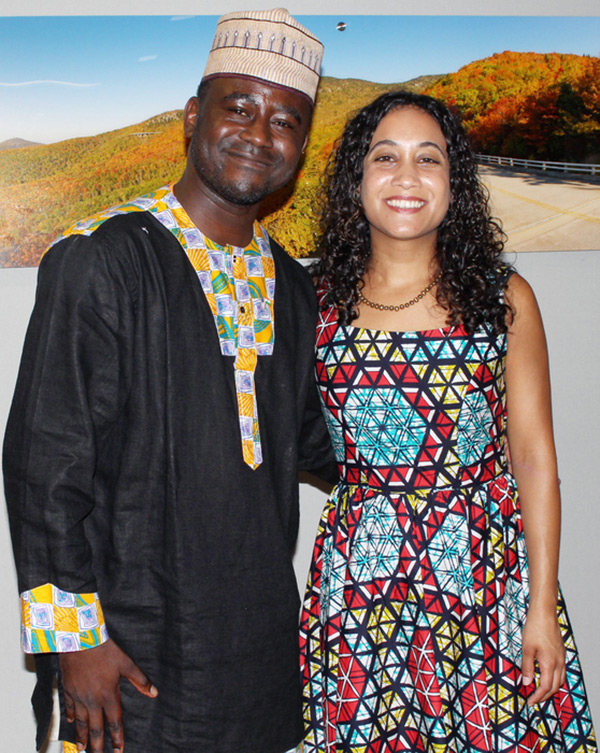
Mandela Fellows Dr. Issoufa Bachir Bounou, left, and Lynn-Joy Isaacs reflect on their six-week visit to Appalachian State University as participants in the 2016 Mandela Washington Fellowship Institute. They were two of 25 young leaders visiting Appalachian from 19 African countries. Photo By @@williamskd6@@
BOONE—For six weeks during summer, Appalachian State University hosted 25 young leaders from 19 African countries from the 2016 Mandela Washington Fellowship Institute. Their time in Boone provided them opportunities to observe, note and discuss practices that allow area nonprofit agencies to flourish.
The Mandela Washington Fellowship for Young African Leaders, begun in 2014, is the flagship program of President Obama’s Young African Leaders Initiative (YALI). The program’s goal is to empower young leaders from sub-Saharan Africa through academic coursework, leadership training and networking opportunities.
This year, the program brought 1,000 Mandela Fellows to higher education institutions across the U.S. and promised support for professional development after they return home. Appalachian was one of 40 public and private institutions hosting the civic leadership institute. During their time in Boone, the fellows attended a series of workshops conducted by faculty, staff and leaders of local nonprofit organizations to learn how American nonprofit agencies function.
The Appalachian Mandela Washington Fellows, along with those from other universities, attended a Presidential Summit in Washington, D.C., in early August. The fellows met with President Obama, as well as several government officials, U. S. entrepreneurs and civil society representatives. Their agenda included additional leadership development sessions, panel discussions, a town hall with the president and an awards ceremony.
At the conclusion of their visit the fellows gathered for a reception hosted by Appalachian’s Office of International Education and Development.
Dr. Jesse Lutabingwa, associate vice chancellor for international education and development, reflected on the visit.
“Appalachian State University was fortunate to have been selected to implement the 2016 Mandela Washington Fellowship Institute,” Lutabingwa said. “The focus of the institute was civic engagement, which is one of Appalachian’s strengths.”
Lutabingwa noted the significance of having many resources in the High Country to enhance the experience for the Mandela Fellows. “We relied heavily on these resources to implement our institute,” he said, “and based on the fellows’ feedback, this was the strength and success of our program. Fellows commented that the institute provided them with ample opportunities to learn about civic leadership from multiple perspectives.”
Lynn-Joy Isaacs, a Mandela Fellow from South Africa, shared her perspective on volunteerism in the U.S. “It is great that one of the biggest ways in which people volunteer in the U.S. is through fundraising,” she said. “This is always a great challenge back home, as nonprofit organizations are usually under-resourced. Asking volunteers to help more with fundraising is a great way of providing some relief to often-overworked and underpaid staff members.”
Dr. Issoufa Bachir Bounou, an agro-environmental engineer from Niger, visited the North Carolina Rural Center as part of his Appalachian Mandela Fellows experience. The organization works, in part, to develop economic strategies with rural communities that face challenges due to limited resources, and Bounou was able to gain ideas to take back with him.
“My visit to the organization made me understand that one of the ways of making change in a community is to identify the potential human resources in the community and assist them in making business in the area of their competence,” Bounou said.
For some Mandela Fellows, their trip to Appalachian was not only their first visit to North Carolina, but also to the U.S. During their visit, members of the High Country community hosted fellows in their homes for a weekend, enhancing their visit with cultural exchange.
Lutabingwa feels this is an important part of the experience. “An exchange of varied experiences at home and abroad increases knowledge of global issues, regions and cultures, and improves intercultural skills,” he said. “At Appalachian, we emphasize this exchange as key to our students’ learning experience. It is also a value for our greater community.”
“Appalachian has already been invited to submit a proposal for the 2017 program and Appalachian plans to apply,” said Lutabingwa.
About Appalachian State University
As a premier public institution, Appalachian State University prepares students to lead purposeful lives. App State is one of 17 campuses in the University of North Carolina System, with a national reputation for innovative teaching and opening access to a high-quality, cost-effective education. The university enrolls more than 21,000 students, has a low student-to-faculty ratio and offers more than 150 undergraduate and 80 graduate majors at its Boone and Hickory campuses and through App State Online. Learn more at https://www.appstate.edu.
What do you think?
Share your feedback on this story.











